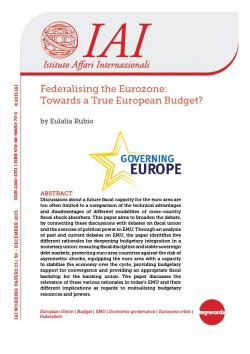Federalising the Eurozone: Towards a True European Budget?
Discussions about a future fiscal capacity for the euro area are too often limited to a comparison of the technical advantages and disadvantages of different modalities of cross-country fiscal shock absorbers. This paper aims to broaden the debate, by connecting these discussions with debates on fiscal union and the exercise of political power in EMU. Through an analysis of past and current debates on EMU, the paper identifies five different rationales for deepening budgetary integration in a monetary union: ensuring fiscal discipline and stable sovereign debt markets, protecting euro area countries against the risk of asymmetric shocks, equipping the euro area with a capacity to stabilise the economy over the cycle, providing budgetary support for convergence and providing an appropriate fiscal backstop for the banking union. The paper discusses the relevance of these various rationales in today’s EMU and their different implications as regards to mutualising budgetary resources and powers.
Paper prepared within the context of “Governing Europe”, a joint project led by the Istituto Affari Internazionali (IAI) and Centro Studi sul Federalismo (CSF) of Turin in the framework of the strategic partnership with Compagnia di San Paolo, International Affairs Programme. Publ. in: Lorenzo Vai, Pier Domenico Tortola, Nicoletta Pirozzi (eds.), Governing Europe. How to Make the EU More Efficient and Democratic, Bruxelles [etc], P.I.E-Peter Lang, 2017, 248 p. (Federalism ; 8), ISBN 978-2-8076-0058-4 (pbk); 978-2-8076-0059-1 (pdf); 978-2-8076-0060-7 (EPUB); DOI: 10.3726/b10699.
-
Details
Roma, IAI, December 2015, 21 p. -
Issue
15|50 -
ISBN/ISSN/DOI:
978-88-98650-75-0
Introduction
1. The early 1990s debates on fiscal integration in the EMU
2. Fiscal union for the euro area: the debates today
2.1. Fiscal discipline and public debts: what type of Eurobonds?
2.2. Cross-country stabilisation: what type of fiscal shock absorber?
2.3. EMU-wide stabilisation: how and in which circumstances?
2.4. Convergence: need for budgetary support?
2.5. Banking union: what type of fiscal backstop?
3. Designing a fiscal capacity for the euro area: some general recommendations
4. Looking forward: different choices
Conclusions
References
Topic
Tag
Related content
-
Ricerca27/01/2015
Governing Europe
leggi tutto



